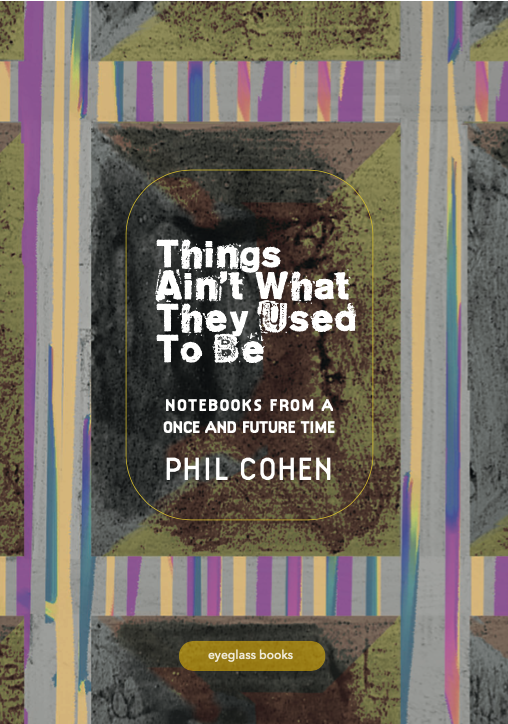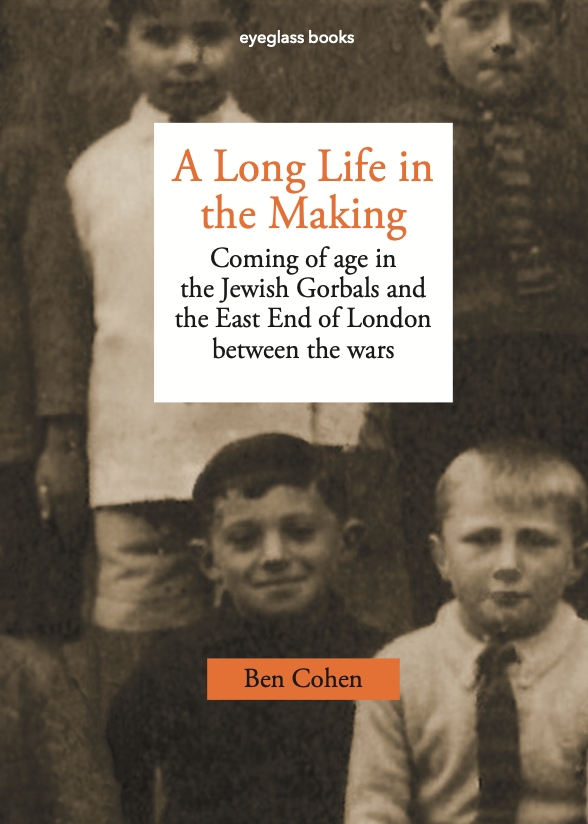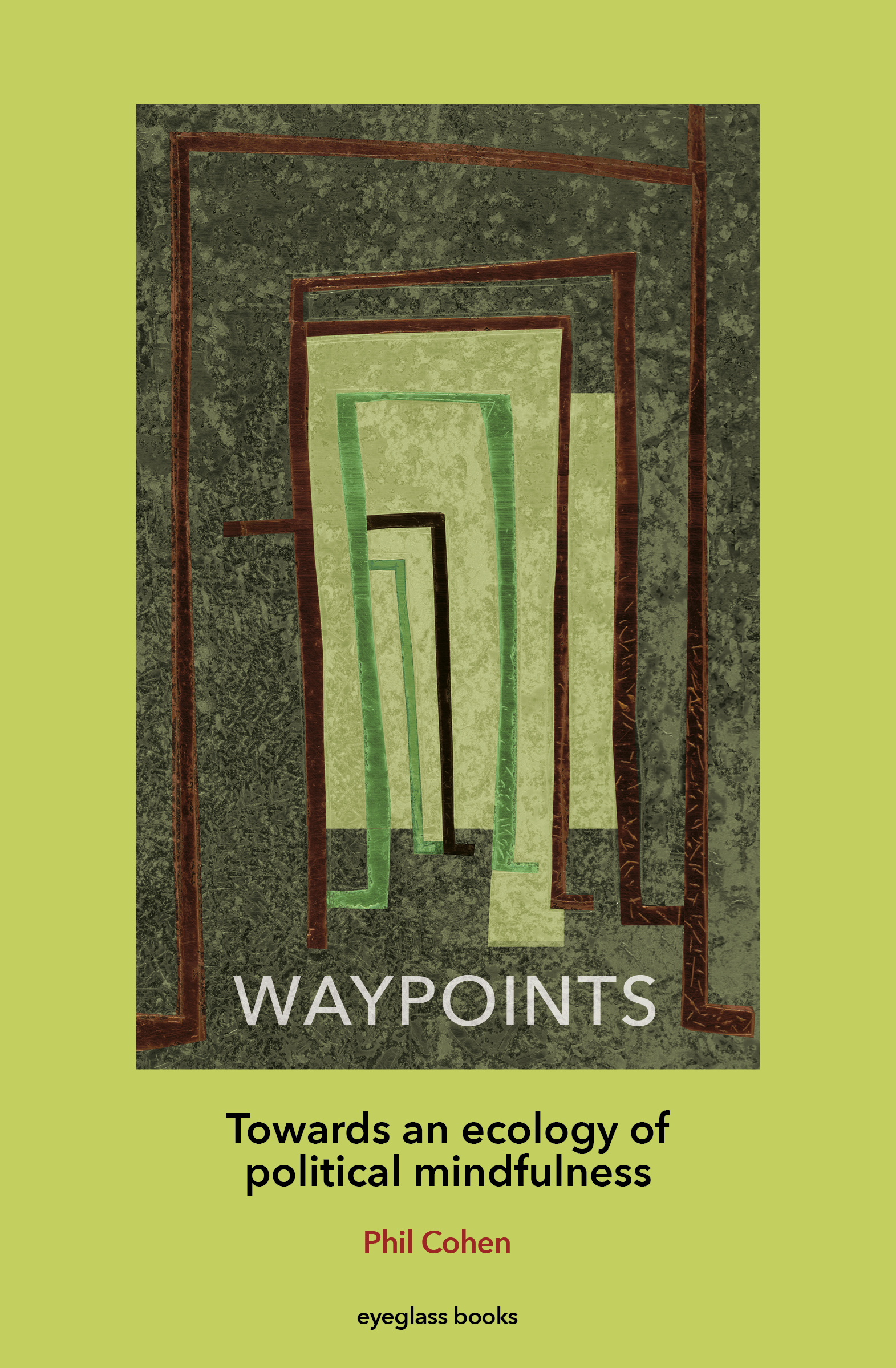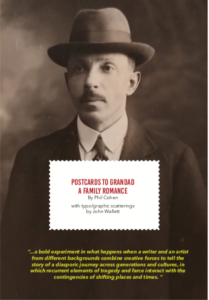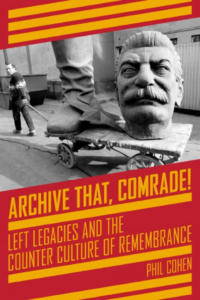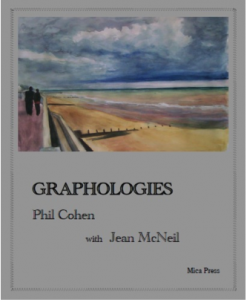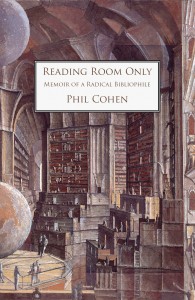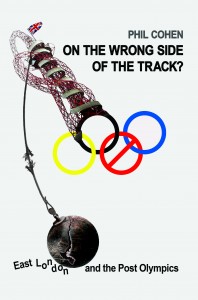FEBRUARY BLOG :THERE GOES THE NEIGHBOURHOOD – AN URBAN TRIPTYCH
‘The neighbourhood is that part of town you have no need to go to because you are already there’ -George Perec
1) Chic by Growl
I recently moved into a new neighbourhood in Islington. My flat is in a large Peabody Estate, off the Essex Road, quite close to the area which Ruth Glass made the object of her famous study on ‘gentrification’. I am living in one of the earliest ‘ model dwellings’ built in the 1860’s for the ‘industrious working classes’ by the great Canadian philanthropist and which became an inspiration for the development of social housing in Britain. Today the estate’s inhabitants are a cross section of all those who cannot afford to buy or rent in the private housing market, and increasingly this is including middle class professional people like myself. A recent study of local housing conditions concluded that by 2020 you would have to be either very rich or very poor to remain in the area at all. Ironically, given the association with ’gentrification’, it is the middle classes who are being squeezed out by London’s rampant housing boom.
By no coincidence, as housing has moved rapidly up the political agenda, the theme of the ‘squeezed middle class’ has become a major focus of political debate. It is, of course, this fraction of the electorate where swing voters are concentrated and which will decide the outcome of the next general election. Ed Milliband has raised the spectre of insecurity amongst ‘hard working families’ who are unable to buy their way into the property owning democracy, unless or until they inherit a house from their parents. The coalition government countered with a scheme to assist first time buyers, but this only served to fuel house price inflation, given the chronic under-supply of affordable homes. They then raised the definition of ‘affordable’ up to 80% of market value, so that in desirable neighbourhoods only people on middle incomes could afford them. They also imposed a ‘bedroom tax’ on lower income families who were supplementing their meager earnings or benefits by renting out a room to lodgers, thus effectively destroying one of the key support structures in working class communities. The war on poverty really has turned out to be a war against the poor.
Much less commented upon is the impact of the housing crisis and austerity measures on the urban fabric and, in particular on the quality of neighbourhood life. For some commentators, the ‘neighbourhood’ in the sense of a place with a distinctive reputational identity, comprising a shared territory of belonging associated with a residential community, no longer exists. Such urban bonds have melted into the thin air of post modernity, and been replaced with de-territorialised, largely virtual communities of interest and association, constituting non-place realms of networking conducted through new social media.
Certainly , for many people ‘the neighbourhood’ is not just an area within walking distance from home, but also comprises a more extended and flexible navigational space. At the same time there has been a process of re-territorialisation in which physical, social and cultural geographies become ever more impacted , and post codes take on an ever more site-specific meanings, for example as marking property hot spots, or gang ‘turf’. So, for example, young people’s sense of neighbourhood may be based on a virtual peer network that extends across the city or even the globe, but the real space they inhabit may be increasingly circumscribed by lack of economic opportunity or social constraint. You may be able to talk to mates on the other side of town, but you may be too poor or too scared , to actually go and visit them.
My neighbourhood is traversed by Essex Road, a busy artery that marks a boundary between the heavily gentrified area to the west abutting on to Upper Street, where expensive boutiques and restaurants rule OK and the large concentrations of social housing to the east. But if it is a front line, it is not one characterized by social tension, but rather by a pattern of co-existence between the relatively affluent and those on low incomes. The two groups go to different shops, use different facilities, have different life styles. So an art gallery, a designer bike shop, a Peruvian restaurant, a specialist fishmongers, a taxidermist, an art deco furniture shop and a luxury bathroom showroom jostle next to a cost cutter, a chippie, a bookies, a traditional bakers, a pawnbrokers, and an internet shop patronised by people who cannot afford a computer. The public library which is only open every other day, thanks to the cuts, is housed in a very distinguished Victorian building, and functions like informal social club for the unemployed, the retired, and others with time on their hands. There are a few places, like the local Co-Op where the classes mix, or at least share the same check out, but otherwise it is a case of ‘ chic by growl’ : the young trendies swish past, often in jogging mode, while the poor, the desperate and the sick grumble amongst themselves as they trudge to and from the low price shops and caffs.
There are some real neighbourhood characters who bridge the gap. There is Moshe who cycles in from Dalston everyday to open his record shop. And it is a record shop – he has several thousand vintage Vinyls for sale. He began by building on his own collection – he is an aficionado of 60’s indie rock, jazz and blues – and now must have one of the most comprehensive in London. He grew up in the old Jewish East End, before it turned into Banglatown, but unlike the rest of his family he didn’t join the diaspora to Ilford and Golders Green, preferring to go on living in the street, and the house where he was born. He sits in his higgledy piggle emporium, wearing an elegant blue suede yarmulke, ready and willing to chew the fat with whoever comes in and wants to pass the time of day; even if they don’t make a purchase, they get to hear a lot of great music while arguing the toss about politics, sport, or religion.
And then there is Mister Hello. Mister Hello can be found standing outside the bookies, come rain or shine, dressed in a large woolen overcoat that has seen better days and which he wears even in a heatwave. He does’nt exactly beg, but if people stop and pass the time of day with him, which many do, he usually asks them if they can spare a few bob because he has just that morning got a sure fire tip on a horse; he will, of course, pay you back as soon as he collects his winnings, and even buy you a drink or two to celebrate. He sure has the blarney and it’s a pleasure to part with a pound just to hear the lilt of his voice as he extols the virtues of the nag he has pinned his hopes on. It is not clear whether he ever actually bets any of the money, but the next time you see him he will wave you over and tell you the most elaborate and often hilarious story about why he was let down by the horse. He is a great gossip and a mine of information about what is going on in the locality. To be acknowledged by Mr Hello, and he reserves his ‘hello’s for his regulars, is to be recognized as fully belonging to the neighbourhood. So although from one standpoint he might be regarded as a tramp, a beggar,a con man and a social parasite, he plays an important and entirely positive role in sustaining the moral economy of the neighbourhood, whether as raconteur, news reporter, or stand up comedian. His presence makes possible those small acts of generosity and concern which we understand by ‘neighbourliness’ and without him life would be less rich, even and especially for the poor.
Moshe is worried that his landlords are going to increase his rent to the point where he will no longer be able to afford to stay there. In a time of recession, the middle class cut back on their hobbies and although he has his loyal customers who travel from all over London and beyond to browse his ware, business is not good. And there is talk that William Hill’s, the bookmakers, may close and be replaced by a new Sainsbury’s or a Café Nero. Many of the other amenities on which the less well-off rely are similarly threatened. If, one day we find that Mr Hello has disappeared and been replaced by a security guard, then we might really say ‘there goes the neighbourhood….
2) Lines of Desire
There is a school of radical urbanists, inspired by the French situationists who celebrate the city, and in particular its streets and public spaces as adventure playgrounds, sites of strange encounter and chance association which open up new human possibilities and subvert the rational ‘lines of desire’ imposed on the human traffic flow by the planners. These metropolitan optimists see the city as offering the potential for a different, more heterogeneous, and fulfilling set of relationships than is afforded by the private domestic sphere.
They are opposed by an ever more vociferous and powerful group of metropolitan pessimists who see the city as a site of danger and degradation, and have elaborated a whole genre of precautionary tales about the terrible things that happen to people who come to them. This position unites anti-urban romantics like Blake with his inveighing against ‘London Babylon’ and conservative moralists who long to return to an organic society’ in which there is a place for everyone and everyone knows their place.
Both schools of thought agree on the risky, potentially transgressive nature of metropolitan life, although they invest it with opposite meaning and value. Take for example the recent ‘right to be naked in public’ campaign. These ‘urban naturists’ seems to be engaged in a classic strategy for hiding in the light ( pace Dick Hebdige). Certainly from a psychoanalytic point of view exhibitionism represents a cover story for what has been inhibited, not an act of liberation. If the campaign is cited by conservative moralists as an example of the kind of things people get up to if left to their own devices, it is because it appears to transgress so dramatically the public/private distinction. But just as I think it could be argued that in fact it does no such thing, so too the scandalised response does not so much transcend these oppositions as restate them. The assumption is that the domestic world is a safe haven whose intimacies have somehow to be extended into the public realm. But the fact is that the realm of domestic life is far more dangerous and open to public inspection than we would like to think. Nosy or noisy neighbours, and poor sound insulation ensure that for many people, especially those living in the worst housing conditions, the ‘private’ is all too public. And, of course, most of the violence and abuse that goes on takes place indoors. If you are in this situation, you may indeed want to escape into the safety of crowded thoroughfares or shopping malls to enjoy some sense of freedom and privacy. Another way of hiding in the light.
My unease at the underlying premises of the city- as- transgression argument goes beyond these particulars and concerns exactly whose experience of public/private space is being referenced here. Many of the discussions are curiously non class, age, gender and ‘race’ specific. I think this may be partly because they remains primarily philosophical and at least for my taste, are not sufficiently grounded in sociological reality principles.
In this tradition of writing, the flaneur, the poet, the artist, the postmodern ethnographer, make the running as the key ‘interlocutors’ of the urban experience ; all of them,of course, feel most at home, literally and figuratively, in the kinds of metropolitan spaces and places where cultural and social mixes are at their most glamorous and flamboyant. So the democratic challenge seems to be to find hints of cosmopolitan life style or exotic otherness in less promising milieux – like suburban high streets or market towns, or run down public housing estates. We become motorway flaneurs, conoisseurs of parking lots, collectors of invisible signs of the times. Wherever there are muppies ( multiculturalised upwardly mobile young people) you will find evidence of people looking to create or consume this kind of do it yourself urbanism, even if no amount of mobile phoning is going to get the rest out of their familiar ruts !
The fact is that issues of safety and danger, adventure and precaution, intimacy and exposure, are highly specific to particular conjunctures of people and places in a way that defies ready generalisation about public/private space. Perhaps to get our bearings on these micro territories in a less socially abstracted way we need a comparative urban phenomenology supplied by local inhabitants themselves. Consider for example the varieties of hopes, fears, expectations and actual strategies of circumnavigation being enacted along the High Street on a bright Spring Saturday morning by :
- A toddler in a push chair
- Two teenagers looking for their friends
- A Family shopping expedition
- A party of sightseers from an American air base
- A chronic sciatica sufferer
- An agoraphobic
- An elderly woman who has been the victim of street crime
- A homeless schizophrenic
It seems unlikely that the range of such experiences will best be captured by using abstract philosophical language viz ‘being like through being other’ or ‘making visible the non public’ (Taussig). When it comes to setting these accounts against one another, we need some alternative way of establishing the limits/ conditions under which each could be somehow accommodated within a single, if multivocal, narrative frame. That is the task we have set ourselves in Living Maps in creating a new Atlas of East London consisting of maps made by groups of local people in areas undergoing rapid social and demographic change. It is an exercise in citizen social science that offers a different way of generating innovative urban policy based on locally situated knowledge but operating within a wider trans-local frame.
3) Grist to the Mill ?
I recently had the experience of meeting a young historian who was working on a PhD about the politics of urban regeneration. He was interested in showing how neo-liberal policies were being implemented and in the process much of the radical thinking about community development and its relation to popular planning which took place in the 1960’s and 70’s were in danger of being consigned to the dustbins of history. He was an Oxford graduate, now based in Berkeley, and seemed very knowledgeable about urban social movements; in particular he was interested to find out about campaigns in East London against the London Docklands Development Corporation in the 1980’s and the more recent anti-Olympic movement. He had read my book on East London and the Olympics and was fulsome in its praise, but I should perhaps have been forewarned of what was to come when he said that it had created a new kind of ‘academic space’. Of course I knew what he meant : the book tries to address a set of issues that are normally wrapped up in a heavily theoretical discourse using an idiom that is accessible to people who do not have a PHD in Cultural Studies.
However as he went on talking I realized, with a sinking feeling, that in addition to being ferociously intelligent, he was enormously ambitious and however much he protested that the purpose of doing the thesis was ‘political’ in fact it was mainly to advance his professional career. Of course there is always a trade off, and the sublimation of political ambitions in academic ones has a long history, not least amongst 60’s radicals like myself. But what I found depressing was the fact that he had no real feeling for the struggles he was researching. They were simply so much grist to his academic mill. For example, the people involved in the campaign against Canary Wharf were largely dockers, or rather ex-dockers, who had seen first their livelihoods and then literally the ground under their feet destroyed by Thatcherism. But as far as this young man was concerned their only significance was that they were pegs on which to hang his argument about neo-liberalism. He wanted to get his hands on archive materials about the campaign, but it never occurred to him to go and actually interview the people who had organized it.
I expect this young historian will write a brilliant thesis, will get a post in a prestigious university and be launched on a career which he will pursue with great energy and determination, to become a professor at an early age. You might say, well what else could he do? Academic life has always been highly competitive and individualistic, and in the age of the ‘neo-liberal university’ the public intellectual culture which supported critical theory and socially engaged research, and sought to embed this work in projects of direct benefit to local communities, has all but withered away. Moreover long term commitment to protracted struggles is very difficult to sustain, especially amongst young people whose precarious economic situation predisposes to short termism, if not outright opportunism as they seek to find a niche for themselves in the world. My young historian mentioned a friend of his who had been involved in a campaign against the austerity cuts, using social media to mobilize protests. Was the campaign still going, I enquired. No, the leader had gone off to China to get a job and the campaign had folded.
Contemporary urban politics is about the way the power of capital is ever more highly concentrated and the power of the State in civil society ever more widely disseminated, especially through the new technologies of surveillance which operate through social media. It is a double whammy which makes it very difficult for urban social movements, like the campaigns in East London, to find an effective and sustainable point of purchase, to leverage additional resources and amenities that will have a real redistributive effect. Despite all the talk of ‘empowerment’ and ‘ convergence’ (i.e. that the life chances of children born in East London will in the future be the same as those born in Kensington and Chelsea), the spatial distribution of poverty and powerlessness becomes both more intensive, concentrated in specific neighbourhoods, and regionally specific ( viz the North/South divide) while the engines of wealth creation remain in ever fewer, unregulated hands.
There is no magical way to unlock this set of contradictions, no amount of ‘critical thinking’, however dialectical will do it, but it is still possible to glimpse the possibilities, if we remain alert enough to what David Graeber has called ‘actually existing communism’. By this he means the cultures of mutual aid that install themselves wherever a hiatus occurs in the apparently seamless integration of the production, distribution, circulation and consumption of commodities. We do not have to believe, like the old anarcho-syndicalists or council communists, that we can build a whole economy and society on these fragile instances, but we can, nevertheless, glimpse in their continual re-invention, the conditions of a different, more egalitarian and human society. Which brings us full circle back to Mr Hello.
The PowerPoint file that accompanies this Blog can be found here: THERE GOES THE NEIGHBOURHOOD
